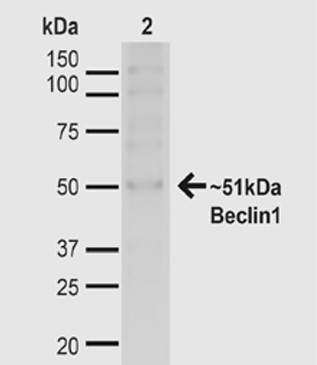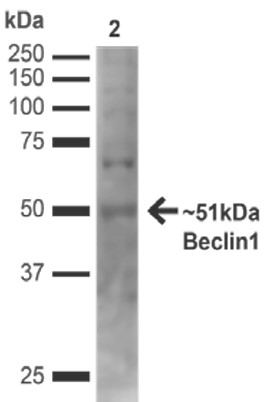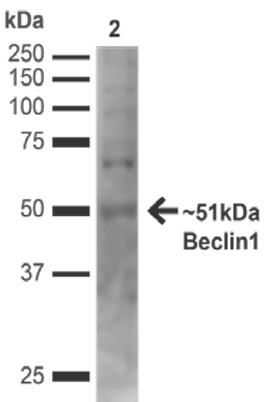Anti-Beclin 1 Antibody (23010)
Data
- -
- -
Antibody DetailsProduct DetailsReactivity Species Human Host Species Rabbit Immunogen Synthetic peptide corresponding to amino acids at the C-terminus of human Beclin 1. Product Concentration 1.0 mg/ml Formulation PBS, pH 7.4, 50% glycerol, 0.09% sodium azide. State of Matter Liquid Product Preparation Purified by Protein A affinity chromatography Storage and Handling This antibody is stable for at least one (1) year at -20°C. Store product in appropriate aliquots to avoid
multiple freeze-thaw cycles. Regulatory Status For in vitro investigational use only. Not for use in therapeutic or diagnostic procedures. Country of Origin USA Shipping Next Day 2-8°C Applications and Recommended Usage? Quality Tested by Leinco Immunoblotting: use at 1- 2ug/mL. A band of ~51kDa is detected.
Immunofluorescence: use at 10ug/mL. These are recommended concentrations. Endusers should determine optimal concentrations for their applications. Each investigator should determine their own optimal working dilution for specific applications. See directions on lot specific datasheets, as information may periodically change. DescriptionSpecificity This antibody recognizes human Beclin 1. Background Autophagy is a catabolic process that results in the degradation of bulk cytoplasmic contents within autophagosomes and lysosomes. Beclin 1, the mammalian orthologue of yeast Atg6, has a central role in autophagy. It interacts with several cofactors (Atg14L, UVRAG, Bif-1, Rubicon, Ambra1, HMGB1, nPIST, VMP1, SLAM, IP3R, PINK and survivin) to regulate the lipid kinase Vps-34 protein and promote formation of Beclin 1-Vps34-Vps15 core complexes, thereby inducing autophagy. Beclin 1 dysfunction has been implicated in many disorders including cancer and neurodegeneration. Antigen DetailsFunction Plays a central role in autophagy (PubMed:18570871, PubMed:21358617, PubMed:23184933, PubMed:23974797, PubMed:28445460). Acts as core subunit of the PI3K complex that mediates formation of phosphatidylinositol 3-phosphate; different complex forms are believed to play a role in multiple membrane trafficking pathways: PI3KC3-C1 is involved in initiation of autophagosomes and PI3KC3-C2 in maturation of autophagosomes and endocytosis. Involved in regulation of degradative endocytic trafficking and required for the abcission step in cytokinesis, probably in the context of PI3KC3-C2 (PubMed:20643123, PubMed:20208530, PubMed:23974797, PubMed:26783301). Essential for the formation of PI3KC3-C2 but not PI3KC3-C1 PI3K complex forms. Involved in endocytosis (PubMed:25275521). Protects against infection by a neurovirulent strain of Sindbis virus (PubMed:9765397). May play a role in antiviral host defense. {PubMed:18570871, PubMed:20208530, PubMed:20643123, PubMed:21358617, PubMed:23184933, PubMed:23974797, PubMed:25275521, PubMed:26783301, PubMed:28445460, PubMed:9765397, PubMed:21364619, PubMed:26263979}. NCBI Gene Bank ID UniProt.org Research Area Autophagy References & CitationsTechnical Protocols |





